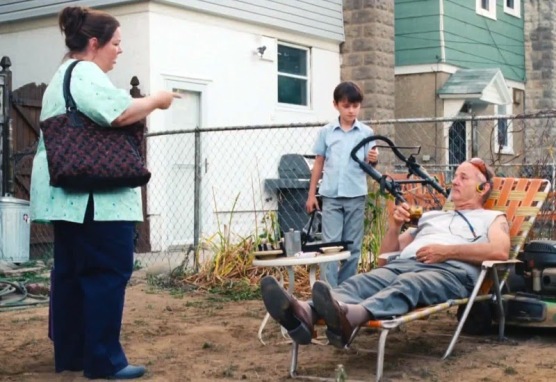The thought of sitting through yet another Bill Murray Oscar-chase that has him playing an aging, misanthropic hipster was not a pleasant one. First time writer/director Theodore Melfi, however, manages to rise above that tired schtick with a story full of heart, no easy answers, and a deep understanding of the complicated beauty of the Catholic faith — the theme that drives his story.
Vincent McKenna (Murray) is a middle-aged, alcoholic Vietnam Veteran with a gambling problem, a loan shark problem, and a dump of a house in Sheepshead Bay. His reverse mortgage has just run out and there’s no Plan B, other than to continue to not give a shit and see what happens.
Vince also has no real emotional life, unless you count his fellow barflies and Daka (Naomi Watts), a Russian hooker so far along in a pregnancy she’s about to lose her stripper job.
Vince is also behind on his Daka payments.

Vince’s new neighbors, single mom Maggie (Melissa McCarthy) and her scrawny 12 year-old son Oliver (Jaeden Lieberheq), literally crash into his life, a situation he takes full financial advantage of. Maggie needs a babysitter, Vince needs easy money. If you think you can figure out the rest from here, you’re wrong.
***SPOILERS COMING***
Plot-wise things happen about as expected — and it’s still entertaining. Character-wise, the redemption story is not so cut and dried. When the credits roll (which you have to stay for), Vince isn’t much of a changed man. He’s still going to drink, gamble, and say terrible things. What’s happened is that the people around him have changed towards Vince because they have taken the time to learn about the man in full, not just the sides he chooses to show.
This happens through a project assigned to Oliver at his new Catholic school, a school portrayed as a pretty wonderful and special place.
“St. Vincent” isn’t a tropey trope about the redemption of a curmudgeon, it’s about the rest of us taking the time and using the love and patience necessary to look at people in the same way God does — as complete human beings who sometimes need us to make the effort to understand, and even to pity.
The same is true of a lout of a husband who is set up as the story’s antagonist and villain. Again, though, Melfi wants us to look past the cliché, and in this case he does so wordlessly. It’s not what happens with this subplot that matters, it’s what doesn’t happen.
With the help of the actors (all terrific) and subtle writing, “St. Vincent” avoids schmaltz. The moments that move you — and there are many — not only creep up, they are earned.
Melfi’s affection for Catholicism isn’t just apparent in the obvious. Daka’s decision to have her child, and what that precious life comes to represent after childbirth, is a powerful (and again unspoken) message, this time a pro-life one.
There’s also a very healthy and politically incorrect lesson about the only way to handle bullies in the real world. Let’s just say Oliver doesn’t go on “Anderson Cooper 360” to crybaby. Vince is a flawed man but he still knows what it takes to be your own man.
Yes, you’ve seen Bill Murray give this same performance a few too many times. But how many times was Bob Hope Bob Hope, Gary Cooper Gary Cooper, and John Wayne John Wayne? Murray needs the right story for his persona, and after a long dry spell, it has finally arrived.
Follow John Nolte on Twitter @NolteNC

COMMENTS
Please let us know if you're having issues with commenting.